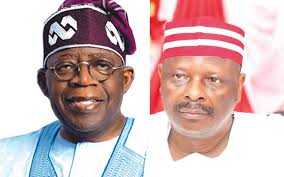“As your incoming president, I accept the task before me. There has been talking of a government of national unity. My aim is higher than that. I seek a government of national competence,” President Bola Tinubu had declared in his acceptance speech as President-elect.
Two months after his victory, precisely in May, Tinubu was true to his words when he held a tripartite meeting with ex-governor of Kano State, Senator Rabi’u Musa Kwankwaso and former Emir of Kano, Muhammad Sanusi II in Paris, France.
At one of the meetings, Tinubu reportedly requested the New Nigeria Peoples Party (NNPP) leader to reach out to his political associates on the need to work together with him (Tinubu).
“The three separate meetings were meant to strengthen ties. The president-elect seriously needs the support of the two leading personalities from Kano,” a reliable source had told Daily Trust.
Ministerial nominee under fire as tweets where he tackled Tinubu resurface
Ministerial list: How Tinubu violated The Constitution -. SAN
“He (Tinubu) told the NNPP leader to choose between the ministry of agriculture and that of education,” another source had said, adding that it was not clear if Kwankwaso would accept to serve under Tinubu.
Kwankwaso’s influence in the North, particularly in Kano politics was further affirmed when he polled over one million votes in the presidential election which he contested and helped Governor Kabir Abba Yusuf to defeat ruling APC in the keenly contested gubernatorial election.
A possible political alliance between Tinubu and Kwankwaso was further fueled by a leaked audio where former Governor Umar Ganduje was heard complaining bitterly that Tinubu had sidelined him.
It even grew stronger after Kwankwaso and the President met behind closed door at the Presidential Villa in Abuja a few days after Tinubu’s inauguration on May 29.
When the Senate revealed the names on the first batch of Tinubu’s much-awaited ministerial list last Thursday and nominees from 11 states, including Kano, were missing, there were claims that the President had yet to fully decide on where to pick from between Ganduje and Kwankwaso’s camps.
The second and final list of the ministerial nominees released on Wednesday appeared to have cleared all doubts, as the two nominees from Kano – Ahmed Tijjani Gwarzo and Dr. Maryam Shetty – belong to Ganduje camp.
“The party hierarchy, under the leadership of immediate past governor of the state, Abdullahi Umar Ganduje, was considered in selecting the (ministerial) nominees,” a top politician from Kano, who preferred to be anonymous, told Daily Trust.
The APC Vice Chairman in Kano, Shehu Maigari, said it was not surprising that Gwarzo was considered by the president based on his *Gwarzo’s) “contribution” to the victory the party in the last presidential election.
Maigari said long before the list was announced, especially since it was clear that the Ganduje would be considered for the national chairmanship of the party, there was optimism that the strong party leaders in the state like Gwarzo would be considered.
Another party leader, who asked not to be named, said while Shetty might appear as a relatively unpopular name among APC leaders in the state, the party leadership knew the essential roles she had been playing in the party at both the state and national level.
Why Kwankwaso was sidelined
Reliable sources told Daily Trust that the ruling APC was not pleased with some of the actions taken by the NNPP-led government in Kano, especially the demolition of structures in several parts of the state.
It was said that the demolition was seen as targeted at discrediting the immediate past government.
“Kwankwaso was really looking forward to a ministerial slot after his meeting with the President in France. But the APC leadership is not happy with NNPP over the demolition,” a source said.
Though the presidency is silent on the dynamics that went into the ministerial lists, another source disclosed to our correspondent that it was believed that giving a slot to Kwankwaso would amount to an attempt to strengthen his political influence, especially in Kano, while further weakening APC in the state.
“It was a calculated decision,” the source said of the choice of ministerial nominees from Kano. “While the president would be interested in working with Kwankwaso and his allies, he would not want to do so to the detriment of APC structure in the state,” the source added.

 Join Daily Trust WhatsApp Community For Quick Access To News and Happenings Around You.
Join Daily Trust WhatsApp Community For Quick Access To News and Happenings Around You.


